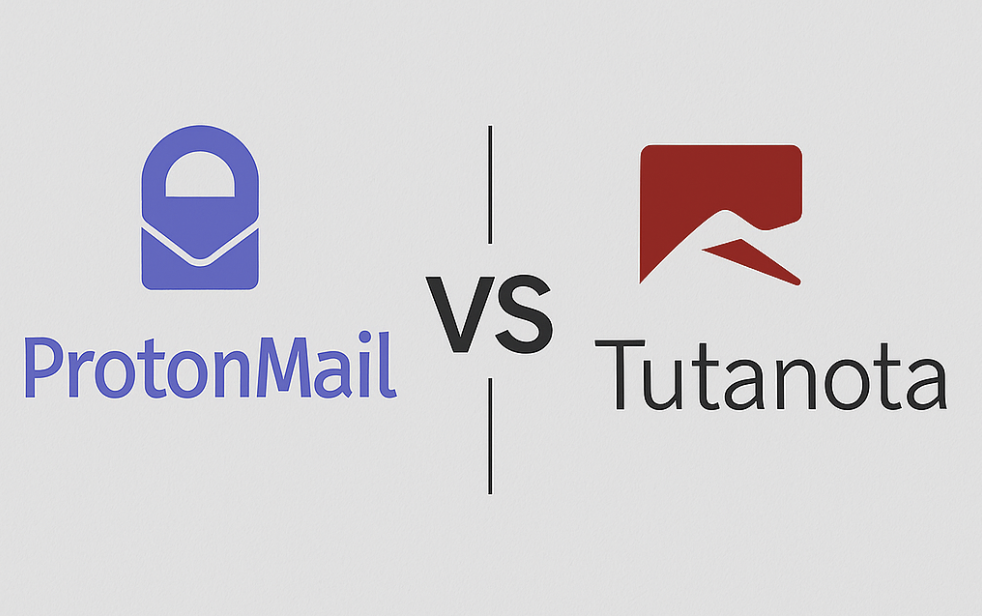ProtonMail vs. Tutanota are the EU’s leading secure email providers. We compared them using 10 criteria to find the best.
In Europe, secure email has become more than a niche concern—it’s necessary. Between GDPR compliance, growing cyber threats, and an increasing awareness of digital privacy, users want email providers that protect them from surveillance and data misuse. Two names dominate the market: ProtonMail, based in Switzerland, and Tutanota, based in Germany.
Both promise strong security and privacy, but how do they compare when we look deeper? We evaluated them across 10 critical criteria for secure EU email.
1. Jurisdiction & Data Protection Laws
- ProtonMail: Based in Switzerland, outside the EU but within Europe. Known for some of the world’s strongest privacy laws.
- Tutanota: Based in Germany, fully under EU jurisdiction and directly subject to GDPR.
Verdict: Both strong, but Switzerland gives ProtonMail extra distance from EU surveillance and broader international protection.
2. End-to-End Encryption (E2EE)
- ProtonMail: Encrypts email end-to-end between Proton users. For external emails, recipients get secure links to read encrypted content.
- Tutanota: Encrypts subject lines and email content. Also offers automatic end-to-end encryption with other Tutanota users.
Verdict: ProtonMail’s E2EE is polished and widely tested. Tutanota’s subject-line encryption is unique, but ProtonMail is more user-friendly.
3. Zero-Access Architecture
- ProtonMail: Zero-access encryption—Proton cannot decrypt your emails. Encryption keys remain user-controlled.
- Tutanota: Same principle—no access for the provider, even if compelled by law.
Verdict: Both equal here.
4. Open Source & Audits
- ProtonMail: Web clients, apps, and Proton Bridge are open source. Independent audits published.
- Tutanota: Apps and core components are open source, but fewer external audits published compared to Proton.
Verdict: ProtonMail leads due to stronger track record of external audits.
5. Data Storage & Hosting
- ProtonMail: All servers in Switzerland with strict security measures.
- Tutanota: Servers in Germany, also highly regulated.
Verdict: Both strong. Switzerland’s legal system gives ProtonMail an advantage in resisting data requests.
6. Security Features & Extra Protections
- ProtonMail: 2FA, encrypted calendar, encrypted drive, Proton Pass (password manager), self-destructing emails.
- Tutanota: 2FA, encrypted calendar, encrypted contacts. No password manager or drive storage yet.
Verdict: ProtonMail wins with its growing ecosystem.
7. Metadata Minimization
- ProtonMail: Does not log IPs by default. Metadata is minimized.
- Tutanota: Logs less data than traditional providers but cannot match ProtonMail’s reputation for metadata protection.
Verdict: ProtonMail.
8. Transparency & Legal Resistance
- ProtonMail: Transparent about legal requests. Publishes transparency reports. Has successfully resisted certain requests in Swiss courts.
- Tutanota: Also publishes transparency reports but had to comply with a 2020 court order to log one user’s IP.
Verdict: ProtonMail has the stronger legal position.
9. Usability & Compatibility
- ProtonMail: Web, iOS, Android, plus Proton Bridge for IMAP/SMTP. Smooth, modern UI. Works well for business integration.
- Tutanota: Web, iOS, Android. Does not support IMAP/SMTP (by design), which limits integration with standard email clients.
Verdict: ProtonMail is more flexible, especially for businesses.
10. Cost, Plans & Scalability
- ProtonMail: Free plan available, premium plans start at €4/month. Business packages scale well. Also includes bundle offers with Proton VPN.
- Tutanota: Free plan available, premium plans start at €1/month. Cheaper, but fewer features compared to Proton.
Verdict: Tutanota is cheaper, but ProtonMail delivers more value for professionals.
Conclusion: Why ProtonMail Is the Best Choice
Both ProtonMail and Tutanota offer secure, privacy-first email solutions that put user rights above advertising models. Tutanota shines with its affordability and innovative encryption of subject lines, making it attractive for budget-conscious users.
However, when it comes to jurisdiction, ecosystem, audits, usability, and metadata protection, ProtonMail is the stronger and more future-proof choice. It’s the best option if you want maximum privacy combined with a professional toolset that scales with your needs.
Key Takeaways
- ProtonMail and Tutanota are the leading secure EU email services.
- Tutanota is cheaper, but less feature-rich.
- ProtonMail wins with stronger legal protections, broader ecosystem, and better usability.
FAQs
Is ProtonMail safer than Tutanota?
Yes, ProtonMail has stronger legal protections, external audits, and metadata protection.
Is Tutanota a good free alternative?
Yes, Tutanota’s free plan is generous, but its limitations (no IMAP, fewer features) make it less flexible.
Which service is better for businesses?
ProtonMail, thanks to Proton Bridge, business plans, and integration with existing workflows.
